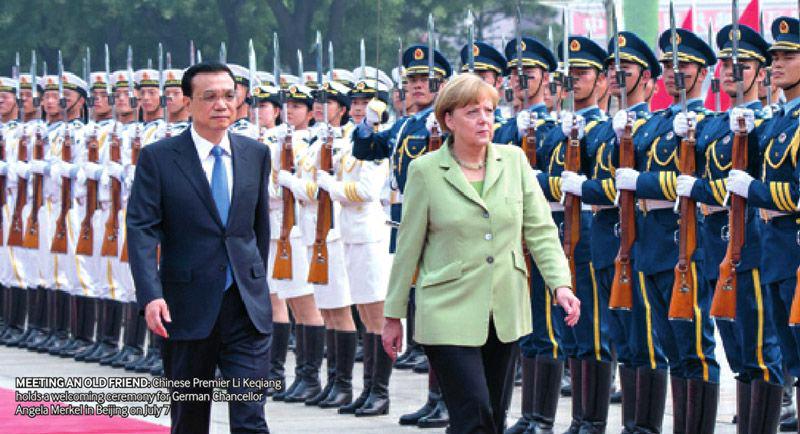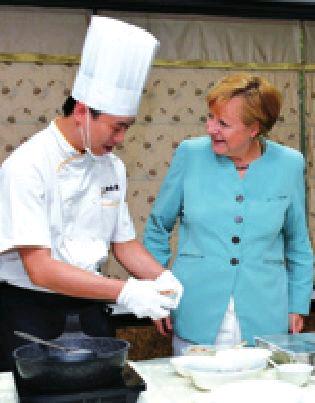Sustaining Momentum
2014-08-14
German Chancellor Angela Merkel de- serves to be called an old friend of the Chinese people after wrapping up on July 8 her seventh visit to China since first assuming Germanys top administrative post in 2005.
Instead of Beijing, Chengdu, capital of southwest Chinas Sichuan Province, became the first stop of Merkels latest three-day visit. Snatching a little leisure time from a busy trip during her stay, Merkel visited a market and learned to make the regions famous Kung Pao Chicken dish from a local chef.
Aside from the culinary experience, Merkel focused on furthering the rapid development of bilateral economic relations between the two countries.
Exploring Chinas west
In interviews with Chinese media, German Ambassador to China Michael Clauss confirmed that Merkel personally chose Chengdu as the first stop of her visit.
The German chancellors decision indicates the strong interest of Germany and its various enterprises in finding investment opportunities in Chinas central and western regions, according to Cui Hongjian, Director of the Department for European Studies at the China Institute of International Studies.
Sichuan is home to 80 million people, nearly equaling the population of Germany. With Chinas large-scale urbanization, local cities, big and small, are busy upgrading municipal infrastructure including waste disposal systems, water and power supply facilities, canals and roads, as well as technology and financial services. Thus, many German financial institutions have shown great interest in the region. During her visit, Merkel was accompanied by several heavyweight bankers including a top executive of Deutsche Bank.
Germany has become a major source of investment in Sichuan. Chengdu, in particu- lar, is now seen as an important springboard for German enterprises to explore the relatively underdeveloped western part of China.
Currently, there are about 160 German companies active in Chengdu. Since 2011, the renowned German industrial giant Bosch Group has made a large investment in the city in developing control systems for automobile chassis and electrical devices. Last year, Siemens launched a research and development base in Chengdu to develop industrial automation products, the first digital enterprise the company has established outside of Germany.
In Chengdu, Merkel attended a forum on cooperation in urbanization between Sichuan and Germany. She also toured a factory operated by German car manufacturer volkswagen, which produces the two popular models Jetta and Passat in its Chengdu factory. The German auto giant is also eyeing Chinas electric car market. In her following trip in Beijing, Merkel attended a ceremony to launch the Sino-German Electric vehicle Charging Project at Tsinghua University, an important step in helping German carmakers to stay one step ahead in Chinas electric car market.
Besides Merkel, the huge development potential of Chinas western region has attracted a lot of other foreign leaders to come and have a closer look. Last year, British Prime Minister David Cameron paid a visit to Chengdu during his trip to China. U.S. vice President Joe Biden made a stop in the city in 2011. Canadian Prime Minister Stephen Harper visited southwest Chinas Chongqing Municipality in 2012. South Korean President Park Geun Hye visited Xian, capital of northwest Chinas Shaanxi Province, where she inspected South Korean electronic industry giant Samsungs large investment project in the city.
Sustainable partnership
German observers have noted that ChinaGermany relations have seen a “golden decade,” but few have claimed to be able to foresee the future of bilateral relations between the two.
In response, Merkels latest China visit has sent a positive message that China and Germany will enjoy a sustainable partnership.
As Chinas growth rate has moderated in recent years, some countries are expressing concerns about the future of the Chinese economy. However, the German business community has demonstrated a consistent confidence in China. It is estimated that German exports to China this year will increase 8 percent year on year. Statistics from a survey of the German Chamber of Commerce in China showed that more than half of German enterprises believe that Chinas economic development environment will continue to improve as its economic transformation speeds up.
In a speech at Beijing-based Tsinghua University on July 8, Merkel said the relatively slowing pace of the Chinese economy is understandable as growth rates vary in the different regions of China.
The Chinese economy is still full of vitality and its western region features particularly fast growth, Merkel said. She added German companies would like to participate in the development of central and west China. Additionally, Germany welcomes Chinese investment and will make efforts to streamline visa processes to facilitate personnel exchanges.
In her speech, Merkel also noted that the entire world will benefit from a healthy Chinese economy. She maintained the Chinese Governments policies could affect the whole world, including Germany.
Cui noted that China and Germany have set up a major framework for economic cooperation that includes big plans for the“green economy.” Great cooperation potential lies ahead in the fields of new energy, environmental protection as well as Chinas urbanization.
Ji Mingkui, a professor of international studies at Chinas National Defense University in Beijing, said Merkels high-frequency visits to China showcase the importance Germany attaches to China.
Germany is currently Chinas largest trading partner in Europe, while China is Germanys number-two export market outside Europe after the United States. Twoway trade volume stood at $161.6 billion last year, accounting for nearly one third of the combined total between China and EU countries.
Ji said the sound state of Sino-German economic relations lies in the fact that the two countries have complementary economies. Germany provides China with products it needs for industrialization, such as machines, specialty chemicals and electronic goods; meanwhile, reasonably priced Chinese consumer goods are in high demand in Germany.
Chinese and German companies signed a number of agreements during Merkels visit, including deals to buy helicopters from Germany. The two sides agreed to establish a new manufacturing base for a joint venture between Chinas FAW Group and volkswagen. They also decided to build an“ecopark” in Qingdao, east Chinas Shandong Province, that will showcase energy-efficient buildings. Air China, a leading Chinese air carrier, signed an agreement with its Star Alliance partner, German airline Lufthansa.
Setting an example
It is worth noting that Merkels China trip came at a time when China marked the 77th anniversary of the start of the War of Resistance Against Japanese Aggression (1937-45). While Merkels visit was unrelated to the event, the attitudes of Germany and Japan toward their wartime history stand in stark contrast to one another.
In her address at Tsinghua University, Merkel said she did not have the right to comment on the Japanese Government, but added that from Germanys point of view, it is important “not to let the tragic history repeat.”
Merkel told Chinese students that after World War II the German people reflected upon their actions during the war. “Every one of us has to reflect on what we have done wrong,” Merkel said of Germanys handling of World War II, adding that many young Germans in the 1960s asked their parents about what life was like under the Nazis.
“It is a painful process, but it is the right thing to do. The new generation also has to face history, and this is crucial to avoid repeating mistakes,” Merkel noted.
Though Merkel was merely reiterating Germanys stance on its wartime history, observers said Japan should draw a lesson from Germany in how to handle its own historical issues and foreign relations.
